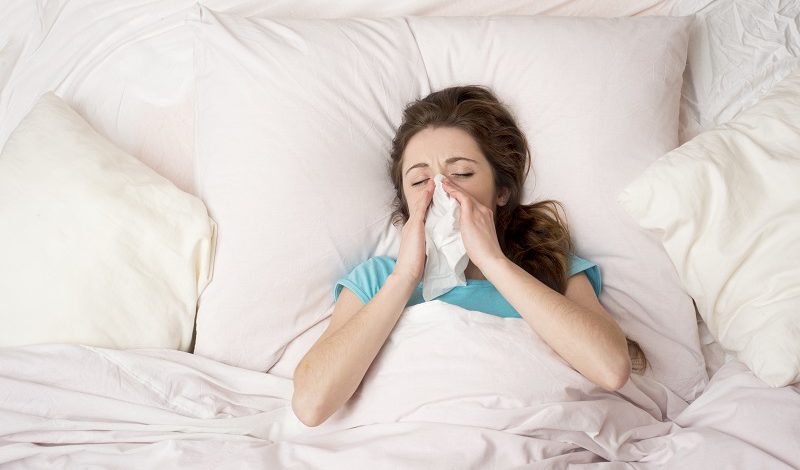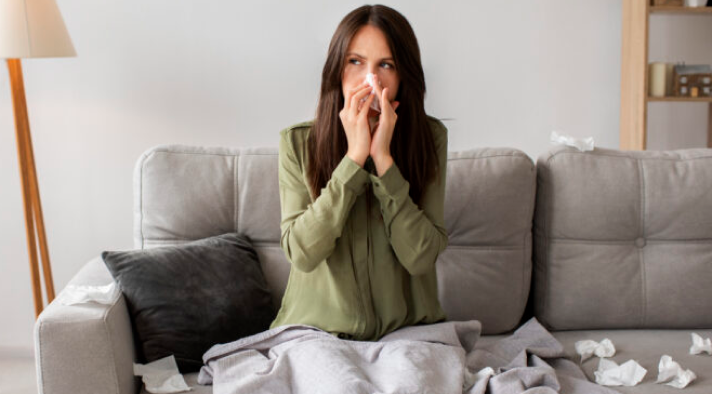October 1, 2020
Indoor Air Quality Tips to Stay Healthy

We all want to do everything we can to stay healthy and avoid the colds, flu, and allergy problems that seem to be a year-round battle, and now, with COVID-19, it’s even more important we do what we can to stay healthy. Vitamins, vaccinations, frequent hand washing, and plenty of sanitizing are important, but one step that is often overlooked in the fight to stay healthy is to improve the air quality in your home. To help you and your family stay healthy (and STOP thinking of the calendar as “cold season, flu season, and allergy season!), we’re sharing some tips to improve your indoor air quality.
Why Is Indoor Air Quality So Important?
Indoor air quality refers to the air quality inside and around buildings, including homes, schools, and churches, and businesses. While we often think of pollution as being an outdoor concern, picturing smokestacks and refineries releasing toxins into the air, indoor pollution is just as serious and, in many cases, more dangerous. The enclosed spaces and lack of airflow in our homes mean there often isn’t any way to “dilute” the particulate matter in the air nor is there enough air flow to carry it away. Instead, pollution and particles hover in the air where they are inhaled and exhaled over and over and recycling through our duct work.
Common Sources of Indoor Pollution
- Fuel burning combustion appliances, such as your furnace;
- Cigarette smoke;
- Pet dander and dust;
- Volatile organic compounds in upholstery, carpet, paint, and pressed wood furnishings;
- Household cleaning chemicals;
- Mold spores and microbial contaminants caused by excess moisture;
- Outdoor air pollution that isn’t filtered as it enters your home;
- Dust mites in carpet and fabric;
Problems Caused by Poor Indoor Air Quality
Indoor pollution can lead to a wide variety of health problems from mild, yet ongoing symptoms to serious chronic health conditions. The most common problems associated with air quality include:
- Headaches;
- Allergy symptoms – stuffy nose, itching eyes, sore throat;
- Asthma attacks
- Dizziness;
- Rashes and skin irritation;
- Nausea;
Because you’re fighting these symptoms, your immune system is unable to fight off illnesses like colds and flu. Then, if you do get sick, poor indoor air quality simply makes it worse.
Simple Ways to Improve Indoor Air Quality
First, let’s look at simple steps to improve the air in your home today.
Cleaning
If dust, mold, and pet dander are triggers for breathing problems, cleaning your home regularly will reduce the issue. Daily vacuuming with a HEPA-filter vacuum will get rid of some of the dust and dander, while keeping your home clean will reduce airborne bacteria. Make sure you vacuum your air intake vent and vents around your home to reduce dust blowing through your home.
Change Your Air Filters
Your furnace, air conditioner, or heat pump cycle air through your home, so making sure clean air can get into the systems will improve your air quality. Changing your air filters once a month will reduce dust and improve efficiency of your system.
Remove Houseplants
There’s a common misconception that plants clean the air and improve air quality, but they also collect mold and release moisture into the air. Many people find houseplants trigger allergies and asthma symptoms, so when you weigh the pros and cons, we find house plants do more harm than good.
Open the Windows
Even in hot and cold months, keep the windows open for a few minutes every few days to bring fresh air into the home and sweep out air pollution.
Most Effective Ways to Stop Indoor Air Pollution
While cleaning and opening windows help, to keep your home (and your family!) as healthy as possible, you want to take more definitive action. These are the long-term ways to get healthy air in your home.
Control Humidity
If your home is too humid, mold spores can grow and bacteria thrives, but too little humidity can dry out your skin, your hair, your throat, and increase viral growth. Having a whole home dehumidifier that ties into your duct work and can be controlled to add moisture or remove it will keep the moisture levels balanced. This will keep you more comfortable, improve the “real feel” of your home’s temperature, and improve your respiratory health.
Have Your Vents Professionally Cleaned
The air you breathe is continually cycling through your home’s ductwork. Heated air and cooled air both go through your heating and cooling systems, then are blown through your home via your duct work. If left ignored, ducts are filled with dust, dander, and particles that are carried through the air as the heat or AC kick on.
By having your vents cleaned once every three years or so, you can eliminate much of the pollution in your home’s air that is cycling through.
Improve Your Air Filtration
Having your vents cleaned regularly is good, but filtering the air that is cycling will prevent dust, dander, mold, and other particles from circulating through your home in the first place. Whole home air filtration systems use HEPA (High Efficiency Particulate Air) filters to get the best possible results for your home, providing hospital-grade filtration at around 99 percent effectiveness.
Increase Air Flow
While opening the windows to air out your home is a good solution for the short term, this is assuming the temperature and the outdoor air quality allows it. If pollen is thick or there are wildfires in the area, the air outdoors is worse than what’s indoors. However, when you increase ventilation through an automated system that works in conjunction with your air filtration, you’ll get a continued flow of fresh clean air in your home, diluting any contaminants and improving air quality.
Schedule an Air Quality Consultation in Garner Today
At Bowman Mechanical Services in Garner, we offer a wide variety of solutions to improve the air quality in your home or business. From duct cleaning to installing comprehensive dehumidifiers, ventilation, and filtration systems, you can rely on us to help you breathe easier and keep your family healthy. Schedule a quote today at (919) 679-9756 or fill out the form below to learn more.

